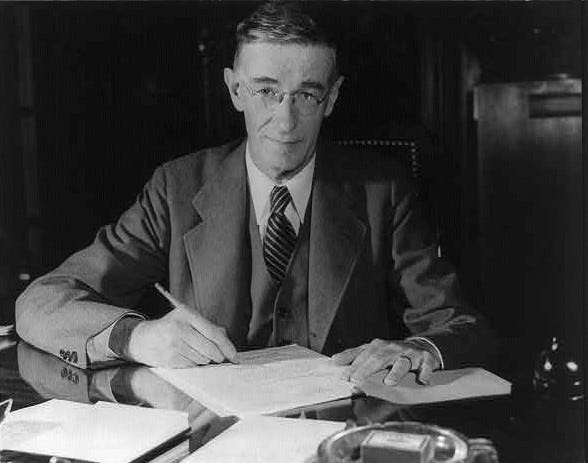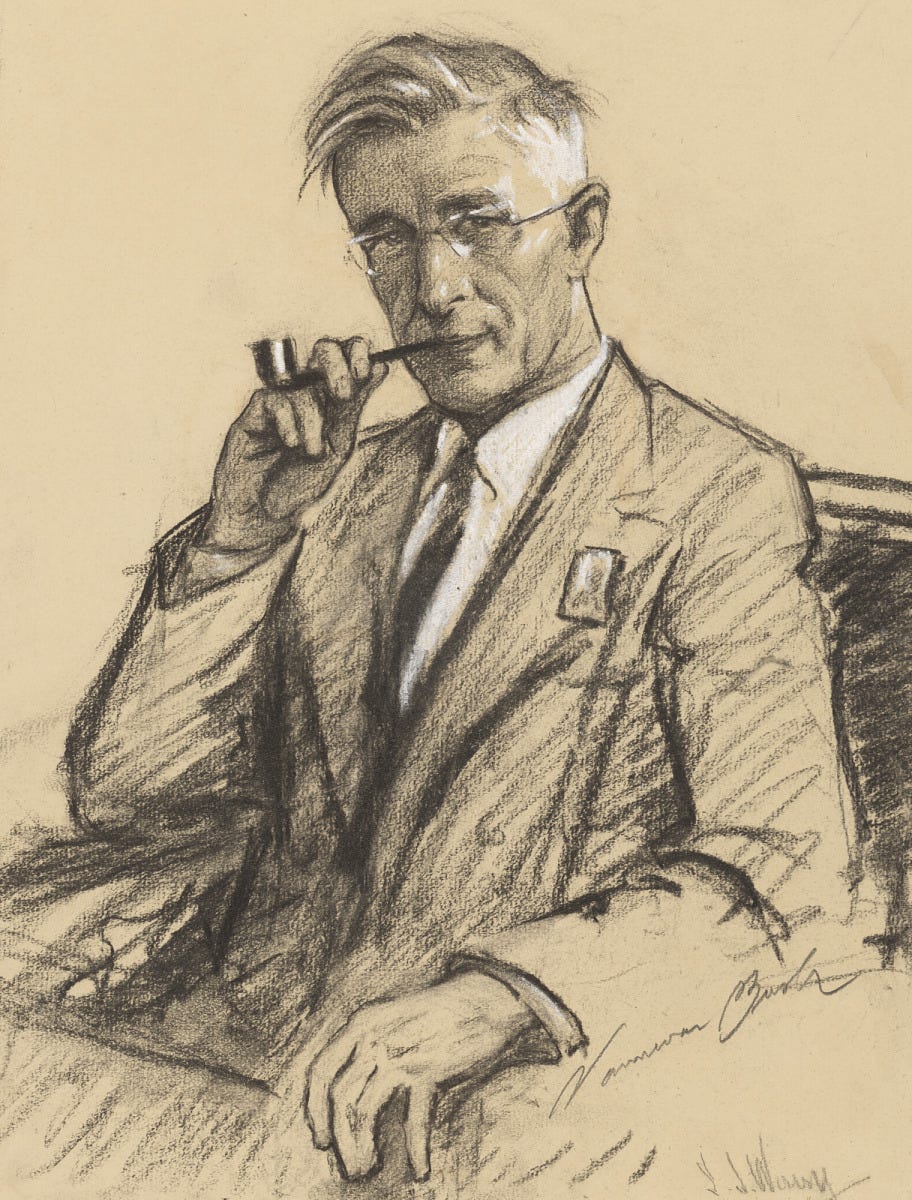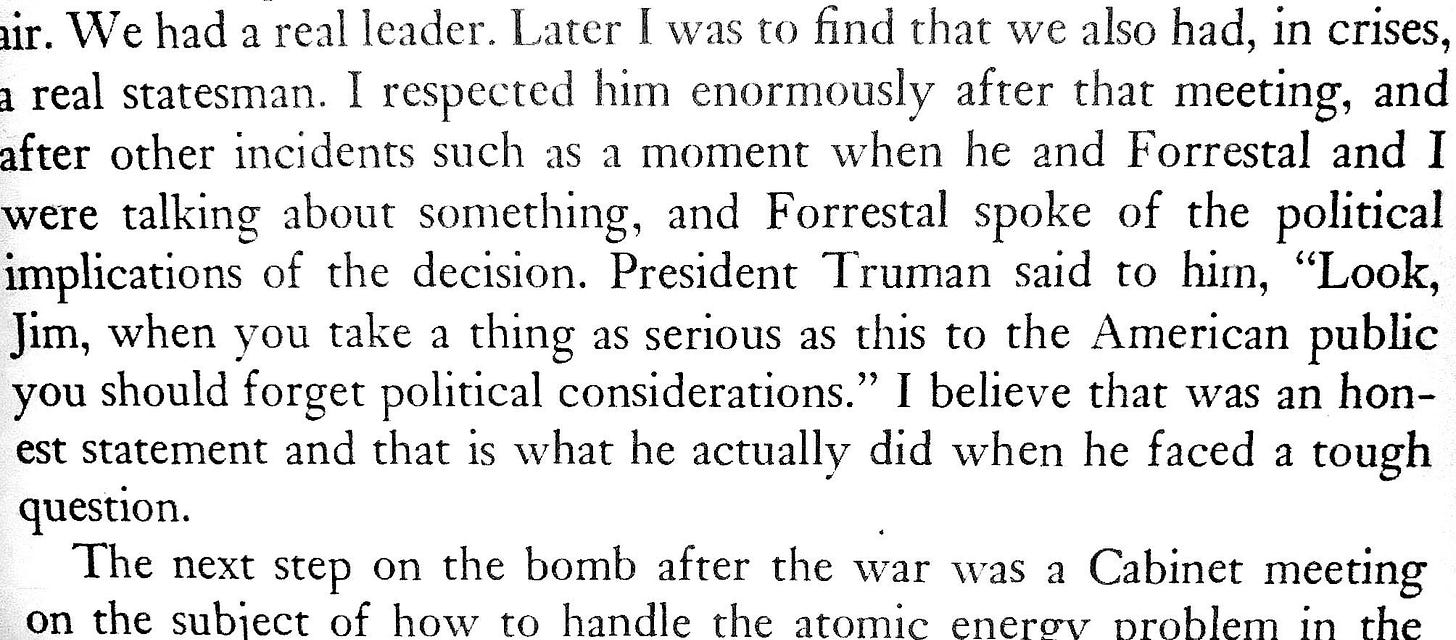In his final book, Vannevar Bush quotes Truman reacting to SecDef Forrestal. And it may be a 53-year-old leak hiding in plain sight.
What did these three discuss on September 24th, 1947? My archive-diving discovery.

[This article is free of any AI content]
Ufology is a topic where essentially anything that can plausibly be said about the phenomenon, correctly or incorrectly, has been said. Newfound nuggets of information come down the pipe all the time. Most people can’t be bothered to give them the time of day because the credibility of the information is uncertain, at least without rigorous research. So the valuable part of this patchwork of information actually comes from identifying the provenance of any piece of information, rather than the piece of information itself. This post adds fresh evidence to the provenance, and content of, one particularly fateful alleged meeting.
Pt. 1: September 24th, 1947, The White House
To appreciate this post, the reader will need at least a passing familiarity with the Majestic-12 documents and therefore what Majestic-12 represents in ufology. The document in question here is: https://majesticdocuments.com/pdf/truman_forrestal.pdf ,
(and reinforced by this subsequent document https://majesticdocuments.com/pdf/eisenhower_briefing.pdf )
Document Summary: September 24th, 1947 marks the start of using the name Majestic Twelve, in which Vannevar Bush and James Forrestal will be active members.
Remember, the authenticity of the above two, and any/all of the rest of the Majestic documents is not guaranteed. Increasing confidence in any of them relies on looking at corroborated external sources.
Therefore the central question is, are any of the Majestic documents authentic even allowing that some forgeries could be inserted among them to sour the milk? It’s a question that preoccupied the late famed UFO researcher Stanton Friedman, and the compilers of the majesticdocuments.com website, Robert and Ryan Wood.
One of history’s giants, Vannevar Bush, is central to the Majestic documents. Yet even without subscribing to their authenticity, (indeed before I knew he was referenced in the Majestic documents), I recognized from the nuclear establishment + UFOs angle that he, among others, would almost certainly have been read-in.
Vannevar & Forrestal
A word on Vannevar Bush, who I will refer to by his first name going forward because of its uniqueness. By any measure, Vannevar has had an outstanding impact on history. As head of the Office of Scientific Research and Development (OSRD) during WWII, he effectively commissioned the Manhattan Project, bringing Gen. Leslie Groves into running it. He also led commissioning the United States’ R&D efforts for radar and the proximity fuze, both of which were central to the war’s outcome. He founded Raytheon, and was colleagues with Harold Edgerton (of EG&G fame to ufologists). He stridently advocated the creation of a basic research organization that would be become NSF.
James Forrestal is the nation’s first Secretary of Defense, in the politically sticky position of unifying the different armed services while coming from deeper ties to one of those services as Secretary of the Navy.
Did the meeting take place? What happened during it?
Enough scene-setting. Back to the Majestic documents: Inspired by Stanton Friedman’s work, Reddit user i-c-e-cold87 recently took the initiative and sourced a valuable photo from the Library of Congress. I encourage looking at the blow-up photo in the post, as it depicts an affable Vannevar with a more reserved, concerned Forrestal.

I-c-e-cold87’s post was a stellar example of effective research in this topic with a simple presentation of links directly to the most credible sources available without any intermediaries in between. It was rightly highly upvoted.
Benefiting from this user’s work, I decided it was worth looking a little further into that September 1947 meeting. In the background, I had been reading Vannevar’s books “Science is Not Enough” (1967), and “Pieces of the Action” (1970). Since Vannevar’s work indicates he seems to care a lot about how effective science is accomplished, I thought he might have sprinkled some nuggets of information in his book that could be (responsibly) read in a Straussian way within the ufology framework. In other words, leaks.
I’m pleased to say, I believe I was not disappointed. On page 295 of the 1970 ed. (freely available online), following a discussion on a prosaic presidential meeting about releasing atomic secrets, we have:
“We had a real leader. Later I was to find that we also had, in crises, a real statesman. I respected him enormously after that meeting, and after other incidents such as a moment when he and Forrestal and I were talking about something, and Forrestal spoke of the political implications of the decision. President Truman said to him, “Look, Jim, when you take a thing as serious as this to the American public you should forget political considerations.” I believe that was an honest statement and that is what he actually did when he faced a tough question.”
-Vannevar Bush, “Pieces of the Action”, 1970
(Bold emphasis mine). And intriguingly, while the book’s index for the name Forrestal yields pages 67, 136, 303, 325, it does not mention the page where this quote comes from, 295, even though it should have.
My main concern was to check whether Vannevar could have sourced the quote from some other meeting in which Truman, Bush, and Forrestal are also present. I was elated to find the Truman archive, and searchable list of his meetings throughout his administration. I’m comfortable stating that other than the very meeting in question, there are none other publicly known. Update:23-Apr-2024 - see update on this next para.
So, unnamed concerns about ‘a thing as serious as this’ for which ‘political considerations’ are out the window ‘if taken to the American public’ was most likely indeed aired during the September 24th, 1947 meeting between Truman, Bush, & Forrestal. Update 23 Apr-2024: A passage nearby to that cited in Pieces of the Action features a cabinet meeting that includes Stimson, Forrestal, Bush, and Truman among others. I can not find this meeting in the Truman library online calendar archive. One may update their priors as appropriate. Given this as well as Stanton Friedman’s assertion that not all meetings are calendared, sometimes for security reasons, it’s worth considering that that outside the cited Stimson cabinet meeting, the meeting containing at least the three of Truman, Bush, and Forrestal can have taken place at any time between Truman’s assuming the office and the presidency and Forrestal’s death. Being unrecorded, that too likely for security implications, one may similarly update their priors as to the sensitive nature of a meeting at which the above quote is uttered.
Alternative explanations?
On brief study, the best alternatives I can come up with are Forrestal’s concerns about inter-service rivalry / jockeying for territory as he becomes the first Secretary of Defense of the armed services under a unified framework, or undue influence of another country in the nation’s defense. I struggle to buy either of these alternatives because neither require Vannevar’s presence at any meeting in which these concerns are aired. The former could plausibly be aired around Vannevar who was looking at structuring research with defense support. But I don’t think concerns about inter-service rivalry is such a soberingly serious topic?
Therefore, I challenge historians to offer alternatives to what matter of great import concerned Forrestal so much that Truman could have been referring to. In the absence of which, I think mainstream history will need to give the Majestic line deeper study. And the rest of us indeed have good reason to ask ourselves…:
What ‘thing’ is Forrestal concerned about taking to the American public?
Forrestal
As is more well-known to ufology lore, Forrestal meets an unfortunate end early the next year. Speculation on the background of his apparent suicide is rife. I would prefer to think he was just very troubled in general by the responsibilities & tensions in his office. However, like others, especially given the quote’s context about going to the public with information, I can’t rule out more untoward explanations.
Pt.2 Deeper read into Vannevar
Since we’re talking about Vannevar, I think it would be helpful to dive a little deeper into his legacy vis-a-vis The [crash retrieval and reverse engineering] Program.
And I must confess that I come in to all this ufology analysis with a pre-existing abiding respect for Vannevar Bush - - i.e. a bias favoring his character. Owing to unrelated circumstances, I’m familiar with the esteem of his name for more than two decades, since long before I started looking at ufology - suffice to say his legacy at several levels has positively benefited my career. And as I read more of his written work, my respect for his organizational acumen only increases.
Other hints
When reading Vannevar, you’re clearly reading someone who wants to see society excel & advance in its scientific capability. As I mentioned earlier reading his books “Science is Not Enough” and “Piece of the Action” in a Straussian way - i.e. looking for subtle but intentional hints - I looked for tech-oriented nuggets of what someone informed at a high-level about UAP thinks the public should study. Of course, Straussian reading is rife with risk because it can lead to false positives. One has to look for contextual clues & alternative explanations to determine if the read is accurate or simply the result of aggravated searching / susceptibility to suggestion.
In “Science is Not Enough”, Vannevar pretty casually refers multiple times about understanding whether/how or universe might be multidimensional beyond three dimensions a well as to whether there could be life on other planets. I can’t hyperlink to the book’s passages, but they’re more or less of a similar ilk as how he refers to these concepts in one of his The Atlantic articles. He was also bearish on rocket technology, being notably vocal against putting a man on the moon in favor of more basic research. In a Majestic ‘alternative history’ world, one can suppose that based on study of recovered craft (that don’t make use of propellant), he felt we would be better off skipping propellant-based technologies and focusing on technologies that hitherto (and still..!) seem to defy our best understanding of physics.
Flys in the reputational ointment?
I mentioned my respect for Vannevar increased from reading his work. However that increase is being tempered because I also begin to feel a sense of foreboding about what he might have been capable of to achieve ends when a perceived sense of national security hung in the balance. He knowingly exudes an obvious patrician streak, an extreme example of what we would today call elite. But in Chapter IV of his book “Pieces of the Action”, he writes of the type of people who would meddle in organizations of the type he runs, undermining his authority:
His breed should be exterminated for the good of society.
Unlike elsewhere, he doesn’t mitigate this statement with context or humor. The needs of wartime might be one thing, but he’s not restricting scope to the wartime context. Therefore I find this statement disturbing. And in the ufology context, given Vannevar’s centrality to the Majestic documents, I have to wonder what he would have been capable of. If and when the ‘alternative history’ that the Majestic documents paints ever becomes clarified, perhaps these particular concerns of mine will prove to be misplaced. But for the moment I’m left somewhat…uncomfortable.

Conclusion
The centrality of Vannevar to the Majestic thread can’t be overstated. When we look at how reverse engineering programs might be organized including at a governance level, at least at an earlier point in history, it’s helpful to understand his outlook on how R&D organizations supporting defense should be structured. “Pieces of the Action” expounds on his views of such an R&D organization’s governance extensively, especially about its board (should be larger than 5-persons like the AEC’s) and its relationship with military - - particularly that it should be deeply collaborating with military in order to be successful. Vannevar didn’t seem to have the kind of concerns about the military-industrial complex that Eisenhower would famously go on to express. Rather, Vannevar was more interested in how to make the military-industrial complex sing. This is why in the Majestic world, if we ever needed to put a face on any seminal organizational architect to the ‘reverse-engineering’ side of the ‘crash retrieval and reverse-engineering’ program — one who can help us see how Program engineers & military representatives work together — then Vannevar’s is the first I would look to.
Update 26-Nov
I’d be remiss in building awareness of my framework for understanding belief-systems if I didn’t append an assertion of the probability of the above inference from VB’s statement being true, so here it is, in the A|B probability format (where 50% represents pure uncertainty).
“In is book, Pieces of the Action, Vannevar Bush leaked a key clue corroborating a meeting with Pres. Truman & James Forrestal regarding The Phenomenon.” 94% | 84%
Update 24-Nov
I’ve reviewed Stanton Friedman’s watershed book “Top Secret/MAJIC” (1996) and Timothy Good’s “Above Top Secret: The Worldwide U.F.O. Cover-up” (late 1980s - and which was the first time the Majestic documents were referred to in book form). No mention of the above Vannevar quote of Truman w/ Forrestal. While there are other sources out there to search through (especially the Woods’ father-son duo) the much-reduced availability of these works leads me to feel this article’s finding is an important contribution: It corroborates that Vannevar, Truman, & Forrestal did indeed discussing a sensitive matter, and, given context such as Friedman’s diligence & Grusch’s claims, that that matter was likely about disclosing about extraterrestrials to the public. They were having this discussion either on 24-Sep 1947 or on another date not showing up in the Truman’s meeting records (which is entirely possible, Friedman shows Truman has meetings that don’t show up in the official log), but then we shall similarly wonder what is the nature of such a meeting that doesn’t show up in the official public record, on a topic that Vannevar doesn’t want to describe publicly. (the other, earlier, meeting Vannevar refers to in “after that meeting”, prosaically regarding publishing atomic secrets, certainly does show up in the Truman archive’s public log).





